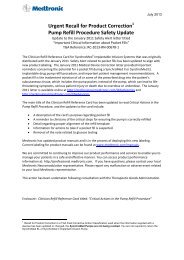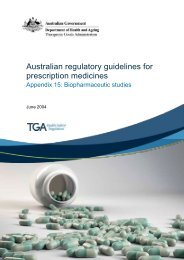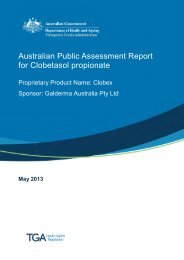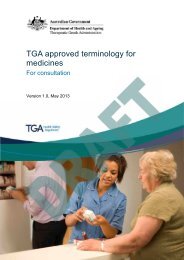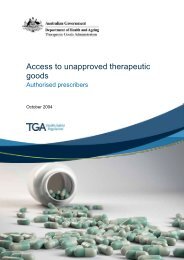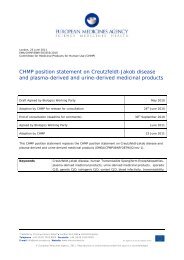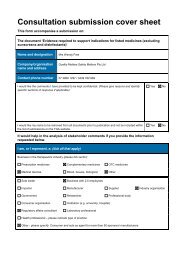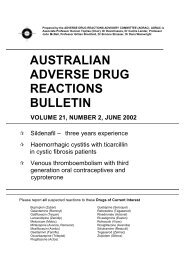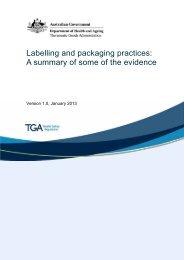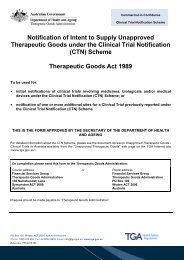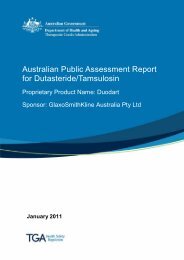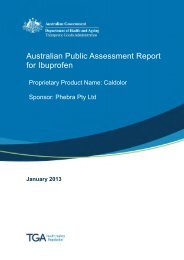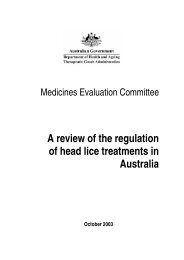AusPAR: Ivabradine - Therapeutic Goods Administration
AusPAR: Ivabradine - Therapeutic Goods Administration
AusPAR: Ivabradine - Therapeutic Goods Administration
Create successful ePaper yourself
Turn your PDF publications into a flip-book with our unique Google optimized e-Paper software.
<strong>AusPAR</strong> Coralan <strong>Ivabradine</strong> Servier Laboratories (Australia) Pty Ltd PM-2010-03269-3-3<br />
Final 31 October 2012<br />
<strong>Therapeutic</strong> <strong>Goods</strong> <strong>Administration</strong><br />
guarantee for the accuracy and reliability of the data of the 46 patients from these centres.<br />
The closure of the centres has thus been decided.”<br />
The clinical study reviewed in this evaluation was otherwise in compliance with GCP<br />
guidelines.<br />
Pharmacokinetics<br />
No new PK data was provided in this submission.<br />
Pharmacodynamics<br />
No new PD data was provided in this submission.<br />
Efficacy<br />
Dosage selection for the pivotal studies<br />
The sponsor has stated that the starting dose of ivabradine in the pivotal SHIFT study was<br />
based on the recommended starting dose for ivabradine in patients with chronic stable<br />
angina (currently approved indication). The dose titration according to heart rate and<br />
symptoms of bradycardia was also based on the dosing guidelines for use of ivabradine in<br />
patients with chronic stable angina.<br />
Proposed new indication for use in patients with symptomatic chronic heart failure<br />
Pivotal SHIFT study<br />
Study design, objectives, locations and dates<br />
The SHIFT study was a randomised, double blind, placebo controlled, multi centre<br />
morbidity-mortality study, evaluating the effects of ivabradine on cardiovascular events in<br />
patients with symptomatic CHF and left ventricular systolic dysfunction.<br />
The primary objective was to demonstrate the superiority of ivabradine over placebo in<br />
the reduction of cardiovascular mortality or hospitalisation for worsening heart failure<br />
(primary composite endpoint), in patients with symptomatic CHF and a reduced left<br />
ventricular ejection fraction (LVEF) and who were concurrently receiving optimal<br />
recommended therapy for CHF. The secondary objectives were to assess the effects of<br />
ivabradine compared to placebo on the primary composite endpoint in patients receiving<br />
at least half of the optimal daily dose of beta blockers at randomisation, on mortality<br />
endpoints (all-cause mortality, cardiovascular mortality, and mortality from heart failure),<br />
on morbidity endpoints (all-cause hospitalisation, cardiovascular hospitalisation and<br />
hospitalisation for worsening heart failure) and on functional capacity and clinical<br />
symptoms of heart failure.<br />
The study was conducted at 625 centres in 37 countries, the majority of the centres being<br />
in Europe. The study started on 26 September 2006 (first visit, first patient) and was<br />
completed on 19 April 2010 (last visit, last patient).<br />
The study design had two parallel and balanced treatment arms. Randomisation was<br />
stratified on beta blocker intake (yes/no) at time of randomisation and on centre. The<br />
study was event driven and designed to terminate after at least 1600 primary composite<br />
endpoints had occurred. The study was divided into two periods: a run-in period of two<br />
weeks (from selection visit [ASSE] to inclusion visit [D000]) to confirm the eligibility of<br />
Page 8 of 101



